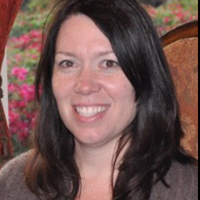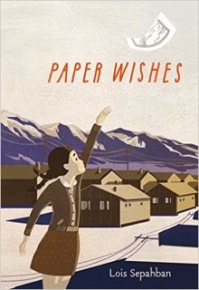Swanky Seventeen Corabel Shofner recently interviewed Lois Sepahban, debut author of the Middle Grade historical novel PAPER WISHES (January 5, 2016 from Farrar, Straus and Giroux).
About the Author
 Lois Sepahban grew up in central California. She spent her childhood reading, climbing trees, and leading her brother and sister on hunts for buried treasures. In college she studied languages and books. She is married and has two children. She lives on a small farm in Kentucky where she has a barn that she fills with animals who need homes. She has two goats, two dogs, six cats, and lots of sweet and fluffy chickens.
Lois Sepahban grew up in central California. She spent her childhood reading, climbing trees, and leading her brother and sister on hunts for buried treasures. In college she studied languages and books. She is married and has two children. She lives on a small farm in Kentucky where she has a barn that she fills with animals who need homes. She has two goats, two dogs, six cats, and lots of sweet and fluffy chickens.
Find her on Twitter, Goodreads, and at her Author Website.
About the Book
 It is March of 1942. Ten-year-old Manami, and her entire family, are sent to Manzanar, a Japanese internment camp in central California. She sneaks her dog onto the ferry, but when a soldier forces her to abandon the dog, the traumatized young girl stops speaking. At the camp, she can only make drawings, paper wishes sent by the wind, for her beloved dog to return. Eventually, it is up to Manami to hold her family together. And she can only do that by learning to speak again.
It is March of 1942. Ten-year-old Manami, and her entire family, are sent to Manzanar, a Japanese internment camp in central California. She sneaks her dog onto the ferry, but when a soldier forces her to abandon the dog, the traumatized young girl stops speaking. At the camp, she can only make drawings, paper wishes sent by the wind, for her beloved dog to return. Eventually, it is up to Manami to hold her family together. And she can only do that by learning to speak again.
The Interview
Corabel: How did you come up for the idea for your novel?
Lois: I grew up in central California, not far from Manzanar. In my early elementary school years, I had a friend whose grandparents had been internees during World War II. His mom spoke to us at school once about her parents’ experiences. That planted a seed for me.
Over the years, whenever we would drive past the road leading to Manzanar, or whenever it was mentioned during history class (usually just a blip of a paragraph in the whole text book), that seed was watered. Books, interviews, photographs of Manzanar all made me stop. Pay attention. Read, listen, look.
A few years ago, I read a photo book about children who lived at Manzanar. Suddenly, the seed for the story sprouted and it was all I could think about. I knew that I wanted the story to be told from the perspective of a little sister who witnessed a love affair between her older brother and someone who was not an internee. For a couple of months, I played with ideas–in my mind and on paper. I read an old newspaper article–in interview with a former internee at Manzanar. He said that at some point, dogs started showing up at the camp. No one knew where they were coming from. This gave me chills. It was a lightbulb moment. I knew what my story was going to be.
The emotional arc of the story came easily, and once I figured out the plot, I couldn’t stop writing. I finished the first draft in less than a month.
Corabel: Are you part of a critique group? If so, how did working with your critique partners benefit you?
Lois: I am one-sixth of Crumpled Paper, an online critique group that’s been going strong for almost 10 years. The first few years we lost and gained members, but for the last 6 years, we’ve been a solid team. There are few people I trust like my critique partners–they have seen my raw, unedited, deeply personal stories. I would definitely not be the writer I am today without their support, and, to be honest, it’s difficult to imagine a writing life without them.
Corabel: Describe your perfect day, when you are not writing.
Lois: I live on a small farm that borders a river. Beside the river, maple and walnut trees form an alley–their branches reach across the trail to join overhead. It is beautiful in every season–pink and green in spring, filled with birds and squirrels in summer, golden and red in fall, and barren in winter.
On a perfect day, I get to walk that trail with my loves. I get to stop at the river and sit on the dock watching for snapping turtles and fish. I get to live in that moment, free from the pressures of deadlines or jobs. It is a sacred, soul-nourishing day.
Corabel: Do you have issues that make it difficult to sit down and write?
Lois: Don’t we all? Kids, a husband, pets. They need my time, too. Add to that a teaching job and maintaining a large property.
I’ve found that I’m most successful when I write in short, focused moments. I use a modified version of the Pomodoro technique to meet daily writing goals. For me, this translates to short, intensely-focused periods of writing – about 30 minutes. After a short break, I return to writing if I can. Otherwise, I handle whatever situation has cropped up and then sit down to write again later when I can give myself another 30 minutes. My daily goal is 5 Pomodoros, so about 2 1/2 hours of writing.
Lightning Round Questions
Big brother, little sister, in the middle, or one and only? Big Sister (a.k.a. Assistant Parent)
What were you reading when you were 12? The Scarlet Pimpernel. Percy Blakeney was my first book boyfriend.
Pets? Hahaha. So many pets. I have 15 permanent residents including dogs, cats, chickens and a hermit crab. We also welcome random visitors.
Vegan or red-meat? Vegetarian. “Animals are friends, not food.”
With whom do you currently live? Spouse and two kids. They’re pretty great.
Who is your first reader of draft novel? Can I pick two? Stephanie Shaw and Lisa Robinson are my go-to girls when I need a beta reader.
About the Interviewer

Corabel Shofner, born in Mississippi, currently lives in Nashville. She is delighted, at long last, to become a published novelist, something she’s been seeking since writing “The Monsters Under My Bed” in first grade. (It was non-fiction.)
THE BRAVE AND WISE RUBY CLYDE
Ruby Clyde, with her kidnapped piglet, struggles to free her mother from jail, but she must get the help of her estranged aunt — an ornery solitary nun in the Texas Hill Country.
Middle Grade, FSG, Jan 2017.
For more bio and stories visit: http://corabelshofner.com
I am so excited about this debut. Can’t wait to see it on the shelves.
LikeLike
Your perfect day is perfect, Lois! ❤
LikeLike
I’ve already pre-ordered this debut! The story sounds beautiful.
LikeLike